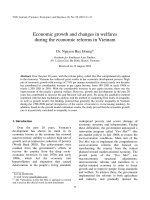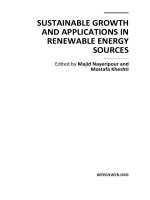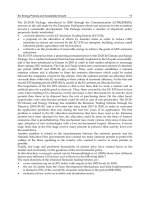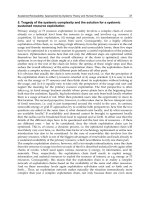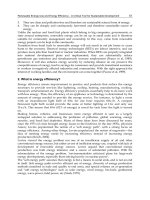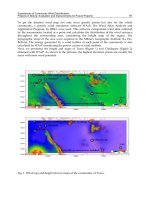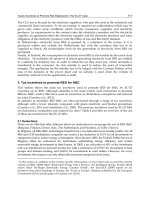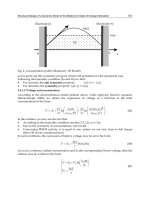Growth and yield of tomato under varied planting dates and cultivars in semi-arid environment
Bạn đang xem bản rút gọn của tài liệu. Xem và tải ngay bản đầy đủ của tài liệu tại đây (233.84 KB, 7 trang )
Int.J.Curr.Microbiol.App.Sci (2020) 9(7): 967-973
International Journal of Current Microbiology and Applied Sciences
ISSN: 2319-7706 Volume 9 Number 7 (2020)
Journal homepage:
Original Research Article
/>
Growth and Yield of Tomato under Varied Planting Dates and
Cultivars in Semi-Arid Environment
L. Shravika1*, G. Sreenivas2, A. Manohar Rao3 and A. Madhavi4
1
Department of Agronomy, College of Agriculture, 2Agro Climate Research Center, ARI,
3
Department of Horticulture, College of Agriculture, Jayashankar Telangana State
Agricultural University, Rajendranagar, Hyderabad - 500 030, India
4
Soil Test and Crop Response, ARI, Rajendranagar, Hyderabad, India
*Corresponding author
ABSTRACT
Keywords
Tomato, dates of
planting, cultivars,
growth, fruit yield
Article Info
Accepted:
11 June 2020
Available Online:
10 July 2020
Many factors limiting tomato production in open field conditions. A field
investigation was under taken to optimize the planting window and cultivar during
kharif 2019 at Agriculture Research Institute, Professor Jayashankar Telangana
State Agriculture University, Rajendranagar, Hyderabad to realize the higher
productivity of tomato. The experiment was carried out with dates of planting (02
Jul, 12 Jul, 22 Jul, 02 Aug, 11 Aug, 23 Aug, 03 Sep and 13 Sep) as main plot
treatment and cultivars US 440 & TO-3251 (Saaho) as sub plot treatment. The
study revealed that 02 Jul planting recorded significantly higher fruit yield of 69.5
t ha-1 with more plant height (95 cm), number of branches plant -1(35.8), LAI
(1.84) number of fruits plant-1 (41.3) and number of fruits m-2(153.1)and this was
on par with 13 Sep (66.8 t ha-1) and 12 Jul (61.5 t ha-1) plantings over rest of the
dates of planting. Even though the cultivars did not differ significantly cultivar US
440 produced more fruit yield (45.8 t ha-1) over TO-3251(41.0 t ha-1).
annual production of 12.43 million tones and
productivity of 19.60 t ha-1 (Cheena at al.,
2018). However, the production is much less
than the requirement, if balanced diet is
provided to every individual.
Introduction
Tomato (Solanum lycopersicum L.) is the
second largest cultivated vegetable crop and
one of the most widely consumed vegetable
crop in the world after potato. Tomato can
play an important role in human diet and
known as protective food because of its
special nutritive value and also its wide
spread production. In India tomato crop
occupies an area of 0.63 million ha with an
In Telangana state tomato is first important
vegetable crop that fetches great remuneration
to the farmers and it is cultivated in open as
well as in protected environment. In
Telangana it occupies an area of 47,070
967
Int.J.Curr.Microbiol.App.Sci (2020) 9(7): 967-973
hectares primarily under irrigated conditions
with a productivity of 26.09 t ha-1
(Horticultural statistics at a glance, 2016).
Materials and Methods
The field experiment was conducted at
Agricultural
Research
Institute,
Rajendranagar, Hyderabad having 17019’ N
Latitude, 78023’ E Longitude and 542.3 m
above mean sea level. The experiment
waslaid out in split plot design with eight
dates of planting (02 Jul, 12 Jul, 22 Jul, 02
Aug, 11 Aug, 23 Aug, 03 Sep and 13 Sep) as
main treatment and two cultivars (US 440 &
TO-3251) as sub treatments, replicated thrice.
The soil of the experimental site was sandy
loam in texture, neutral in reaction, low in
available nitrogen, phosphorus and high in
available potassium. The other package of
practices used recommended for raising the
crop. Data on different characters viz., growth
and yield attributes and yield, were subjected
to analysis of variance procedures as outlined
for split plot design (Gomez and Gomez,
1984).
The commercial production of tomato
particularly grown under open field
conditions is severely affected by various
weather parameters like temperature, rainfall
and humidity etc., and ultimately affect the
yield and quality of fruit.
Temperature and relative humidity play a
vital role in tomato growth, fruit setting,
number of seeds and thereby the shape of
fruits (Sharma and Tiwari, 1992). Due to high
temperature physiological disorders like
flower and fruit abscission are seen in tomato
(Abdul-Baki, 1991).
It becomes very essential to find out the best
date of transplanting to expose the plants to
most conducive atmosphere for growth, fruit
setting and quality characters. Favourable
growing environment alone can’t significantly
boost up tomato productivity, also depends on
the cultivars or genotype and management
practices like optimum date of planting.
Results and Discussion
Plant height (cm)
Based on the analysis of variance (Table 1)
dates of planting had a significant effect on all
growth attributes. During the study plant
height increased as the age of crop advanced.
Maximum plant height was recorded in 02 Jul
planting and was on par with 03 Sep and 12
Jul, in turn 12 Jul planting was on par with 03
Sep planting plantings and were significantly
superior over rest of dates of planting at all
the crop growth stages. And significantly
lowest plant height was recorded in 02 Aug
planting. Sunil (2005) reported increased
plant height with temperatures in tomato at
IARI, being a heat loving crop the increase in
temperature gave a near optimum condition
for growth and development. The increased
plant height in 02 Jul, 13 Sep and 03 Sep
plantings at all growth stages was due to
relatively warmer temperature during
Increased productivity is attained only when
tomato is grown with adopting improved
varieties and agrotechniques. Tomato
productivity at a given location depends on
the potential of the genotype used and timely
availability of resources (Isah et al., 2014).
Some varieties may remain favorable for
many years while others might be replaced by
newer cultivars after a few seasons. Hence
there also need to find out the best cultivars
for particular region suitable for current
situation.
Keeping the above points in view the present
study was conducted to evaluate the effect of
dates of planting and cultivars on growth and
yield of tomato.
968
Int.J.Curr.Microbiol.App.Sci (2020) 9(7): 967-973
vegetative phase then it may leads to hastened
growth rate more than developmental rate
resulting in taller plants. Plant height (cm)
was not differ significantly due to cultivars at
all crop growth stages except during 50%
flowering stage. At 50% flowering cultivar
US 440 recorded significantly more plant
height than TO-3251.
to the lowest maximum temperatures
prevailed during vegetative phase resulted in
increased LAI due to more translocation of
photosynthates (Harssema, 1977). LAI did
not differ significantly with cultivars at
different crop growth stages except during
50% flowering stage. During 50% flowering
cultivar US 440 recorded significantly more
LAI over TO-3251(Saaho).
Number of branches plant-1
Yield attributes
Dates of planting showed significant
influence on number of branches plant-1
(Table 2) at all crop growth stages.
Significantly more number of branches plant-1
was noticed in 02 Jul planting at all crop
growth stages and was on par with13 Sepand
12 Jul plantings, in turn 12 Jul planting was
on par with 03 Sep planting and were
significantly superior over rest of the dates of
planting. And significantly lowest number of
branches-1 was recorded in 02 Aug planting.
Analysis of data revealed that all the yield
attributes and yield except average fruit
weight were significantly (p ≤0.05) affected
due to variable weather conditions (Table 3).
Number of fruits plant-1
Significantly more number of fruits plant-1
(Table 4)was observed in 02 Jul planting and
was on par with 13 Sep and12 Jul plantings,
in turn 12 Jul planting was on par with 03 Sep
planting and were significantly superior over
the rest of dates of planting. And significantly
lowest number of fruits plant-1 was recorded
in 02 Aug planting.
This increase in number of branches plant-1
was due to the higher temperature that
prevailed during vegetative phase resulted in
greater
photosynthesis
and
higher
mobilization of assimilates (Bhuvanaswri et
al., 2018). Similarly Islam et al., (2017) also
reported more number of branches plant-1with
high temperatures.Number of branches plant-1
was not differ significantly due to cultivars at
all crop growth stages.
The increase in number fruits plant-1was due
to negative relationship with rainfall during
fruit development phase is probably due to
rain enhancing fruit drop (Mutkule et al.,
2018). Titilayo et al., (2014) also reported
negative correlation between rainfall and
number of fruits plant-1. Cultivars did not
differ significantly with regarding number of
fruits plant-1.
Leaf area index (LAI)
Dates of planting showed significant
influence on LAI at all crop growth stages
(Table 3).Higher LAI was recorded in 02 Jul
planting at all crop growth stages and was on
par with13 Sep and12 Jul plantings, in turn 12
Jul planting was on par with 03 Sep planting
and were significantly superior over rest of
the dates of planting. And significantly lowest
LAI was recorded in 02 Aug planting.
Increased LAI at02 Jul planting might be due
Number of fruits m-2
Significant increase in number of fruits m-2
(Table 4)was observed in 02 Jul planting and
was on par with 13 Sep and12 Jul plantings,
in turn 12 Jul planting was on par with 03 Sep
planting and were significantly superior over
the rest of dates of planting.
969
Int.J.Curr.Microbiol.App.Sci (2020) 9(7): 967-973
Table.1 Plant height (cm) of tomato at various growth stages under different
dates of planting and cultivars
Treatments
First flower
Date of planting
42 a
02 Jul
39 ab
12 Jul
33 c
22 Jul
d
24
02 Aug
26 d
11Aug
30 c
23 Aug
38 b
03 Sep
41 a
13 Sep
1
S.Em+
3
CD (P=0.05)
Cultivar
34
US 440
34
TO-3251
0.5
S.Em+
NS
CD (P=0.05)
Interaction (D X V)
Factor(V)at same level of D
2
S. Em+
NS
CD (P=0.05)
Factor (D)at same level of V
S. Em+
CD (P=0.05)
1
NS
50% flowering
Fruit initiation
First picking
Last picking
59 a
55 ab
47 c
40 d
41 d
46 c
54 b
58 a
1
4
75 a
71 ab
58 c
43 d
47 d
55 c
68 b
72 a
1
4
92 a
88 ab
77 c
70 d
71 d
76 c
87 b
90 a
1
4
95 a
91 ab
80 c
73 d
74 d
79 c
88 b
92 a
1
4
51
49
0.5
1.5
62
60
0.5
NS
82
81
0.7
NS
84
84
0.4
NS
2
NS
2
NS
2
NS
2
NS
2
NS
2
NS
2
NS
1
NS
Table.2 Number of branches plant-1 of tomato at various growth stages under
different dates of planting and cultivars
Treatments
First flower
Date of planting
13.1a
02 Jul
12.3 ab
12 Jul
9.8 c
22 Jul
8.2 d
02 Aug
8.4 d
11Aug
9.6 c
23 Aug
11.2 b
03 Sep
12.7 a
13 Sep
0.3
S.Em+
1.1
CD (P=0.05)
Cultivars
10.7
US 440
10.6
TO-3251
0.1
S.Em+
NS
CD (P=0.05)
Interaction (D X V)
Factor (V) at same level of D
0.5
S. Em+
NS
CD (P=0.05)
Factor (D) at same level of V
0.4
S. Em+
NS
CD (P=0.05)
50% flowering
Fruit initiation
First picking
Last picking
16.8 a
15.3 ab
11.4 c
9.0 d
9.3 d
10.9 c
13.7 b
15.5 a
0.6
1.9
20.5 a
18.4 ab
12.8 c
8.9 d
9.2 d
12.1 c
16.4 b
18.9 a
0.8
2.6
36.9 a
32.9 ab
26.8 c
19.8 d
20.0 d
25.8 c
31.9 b
34.2 a
1.6
4.9
35.8 a
31.9 ab
25.8 c
19.8 d
20.0 d
25.1 c
30.7 b
33.2 a
1.5
4.5
13.2
12.3
0.3
NS
14.8
14.2
0.4
NS
28.9
28.2
0.5
NS
28.1
27.5
0.5
NS
0.9
NS
1.2
NS
2.3
NS
2.1
NS
0.9
NS
1.1
NS
1.9
NS
1.8
NS
970
Int.J.Curr.Microbiol.App.Sci (2020) 9(7): 967-973
Table.3 Leaf area index (LAI) of tomato at various growth stages under
different dates of planting and cultivars
Treatments
Date of planting
02 Jul
12 Jul
22 Jul
02 Aug
11Aug
23 Aug
03 Sep
13 Sep
S.Em+
CD (P=0.05)
Cultivars
US 440
TO-3251
S.Em+
CD (P=0.05)
Interaction (D X V)
Factor (V)at same level of D
S. Em+
CD (P=0.05)
Factor (D)at same level of V
S. Em+
CD (P=0.05)
First Flower
50% flowering
Fruit initiation
First picking
Last picking
0.16 a
0.14 ab
0.24 a
0.21 ab
0.92 a
0.82 ab
1.84 a
1.64 ab
0.66a
0.60 ab
0.08 c
0.02 d
0.03 d
0.07 c
0.12 b
0.15 a
0.01
0.03
0.13 c
0.07 d
0.08 d
0.12 c
0.18 b
0.22 a
0.01
0.03
0.53 c
0.23 d
0.24 d
0.45 c
0.73 b
0.86 a
0.06
0.18
1.05 c
0.52 d
0.53 d
0.90 c
1.45 b
1.72 a
0.12
0.36
0.41 c
0.14 d
0.20 d
0.36 c
0.53 b
0.64 a
0.03
0.11
0.10
0.09
0.003
NS
0.17
0.15
0.004
0.01
0.62
0.57
0.03
NS
1.25
1.16
0.05
NS
0.46
0.43
0.01
NS
0.01
NS
0.01
NS
0.08
NS
0.17
NS
0.05
NS
0.01
NS
0.01
NS
0.08
NS
0.15
NS
0.04
NS
Table.4 Yield and yield attributing characters of tomato under different dates of
Planting and cultivars
Treatments
Date of planting
02 Jul
12 Jul
22 Jul
02 Aug
11Aug
23 Aug
03 Sep
13 Sep
S.Em+
CD (P=0.05)
Cultivars
US 440
TO-3251
S.Em+
CD (P=0.05)
Interaction (D X V)
Factor(V) at same level of D
S. Em+
CD (P=0.05)
Factor (D)at same level of V
S. Em+
CD (P=0.05)
Number of fruits plant-1
Number of fruits m-2
Average fruit weight (g)
Fruit yield
(t ha-1)
41.3 a
38.0 ab
24.8 c
10.6 d
14.6 d
23.6 c
33.1 b
40.2 a
2.5
7.7
153.1 a
140.9 ab
91.7 c
39.2 d
54.1 d
87.5 c
122.4 b
148.8 a
9.3
28.4
48.6
45.0
39.7
33.4
37.1
39.6
44.0
45.7
4.4
NS
69.5 a
61.5 ab
34.2 c
12.3 d
16.8 d
32.3 c
53.5 b
66.8 a
3.9
11.8
28.7
27.8
0.7
NS
106.3
103.1
2.6
NS
43.3
40.0
1.7
NS
45.8
41.0
2.2
NS
3.5
NS
13.1
NS
6.2
NS
5.4
NS
2.9
NS
10.7
NS
5.5
NS
5.9
NS
971
Int.J.Curr.Microbiol.App.Sci (2020) 9(7): 967-973
And significantly lowest number of fruits m-2
was recorded in 02 Aug planting. The
increase in number of fruits m-2 was due to
increased number of fruits plant-1 at
respective dates of planting.Cultivars did not
differ significantly with regarding number of
fruits m-2.
Ragavan, T., Krishnamoorthy, V and
Sivakumar, T. 2018. Upshot of Various
Transplanting Date and Nitrogen Doses
on Growth and Yield of Tomato over
Trichy Region of Tamil Nadu.
Int.J.Curr.Microbiol.App.Sci.7(3):
1565-1569.
Cheena, J., Saidaiah, P., Geetha, A and
Tejaswini, N. 2018. Effect of sowing
dates on yield and growth of
indeterminate tomato varieties under
poly house conditions. J. Pharmacogn.
Phytochem. 7(2): 880-882.
Gomez, K.A and Gomez, A.A. 1984.
Statistical Procedures for Agricultural
Research (1st Edition), Jhon Wiley and
Sons, Wiley and Sons, Wiley Inter
Science Publication, New York, USA.,
680.
Harssema, H. 1977. Root temperature and
growth of young tomato plants.Ph.D
thesis. Wageningen.
Horticultural statistics at a glance 2016,
Horticulture Statistics Division.
Isah, A.S., Amans, E.B., Odion, E.C and
Yusuf, A.A. 2014. Growth Rate and
Yield of Two Tomato Varieties
(Lycopersicon esculentum Mill) under
Green Manure and NPK Fertilizer Rate
Samaru Northern Guinea Savanna. Int.
J. Agron. 1-8.
Islam, Mohammad Mahbub Islam, Md.
Abubakar Siddi1, Nigar Afsana,
Mominul Haque Rabin, Md. Delwar
Hossain, Suraya Parvin. 2017. Variation
in Growth and Yield of Tomato at
Different Transplanting Time. Int. J.
Sci. Res. Pub. 7(2): 142-145.
Mohanthy, B.K. 2003. Genetic viability
correlation and path coefficient studies
in tomato. I. J. Agri. Res.37(1): 68-71.
Mutkule, D.A., Jadhav, R.A and Khobragade,
A.M. 2018. Influence of different
thermal regimes and phenophases on
fruit yield of tomato varieties. J.
Pharmacog. Phytochem.1: 3029-3031.
Average fruit weight (g)
Dates of planting and cultivars did not show
any significant influence on average fruit
weight (g) of tomato (Table 4).
Fruit yield (t ha-1)
Significantly more fruit yield t ha-1 (Table 4)
was observed in 02 Jul planting and was on
par with 13 Sep and12 Jul plantings, in turn
12 Jul planting was on par with 03 Sep
planting and were significantly superior over
the rest of dates of planting.
And significantly lowest fruit yield was
recorded in 02 Aug planting. The increased
fruit yield from the current experiment was
due to positively correlated growth and yield
attributes with fruit yield of tomato. This
result confirmed the earlier findings of
Srivastava et al., (2013) and Mohanthy
(2003).Cultivars did not differ significantly
with regarding fruit yield of tomato.
Based on the experiment result optimum
planting time for tomato would be from 02 Jul
(69.5 t ha-1)to 12 Jul (61.5 t ha-1) and on 13
Sep (66.8 t ha-1) proved to be best to obtain
higher fruit yield in Semi Arid environment.
References
Abdul-Baki, A. A. 1991. Tolerance of tomato
cultivars and selected germplasm to
heat stress. J. Am. Soc. Hortic. Sci.
116(6): 1113-1116.
Bhuvanaswri,
P.,
Geethalakshmi,
V.,
972
Int.J.Curr.Microbiol.App.Sci (2020) 9(7): 967-973
Sharma, N. K and Tiwari, R.S. 1992. Effects
of dates of planting on growth and yield
of Tomato (Lycopersicon esculentum
Mill.) cv. "Pusa Ruby". Prog. Hort. 24
(34): 188-191.
Srivastava, K., Kumari, K., Singh, S. P and
Kumar R. 2013. Association studies for
yield and its component traits in tomato
(Solanum lycopersicum L.). Plant Arch.
13 (1): 105-112.
Sunil, K.M. 2005.Characterizing Thermal
Environment and Spectral Reflectance
in Relation to Growth and Yield of
Tomato and Bottle Gourd. Ph. D.
Thesis. Indian Agricultural Research
Institute, New Delhi.
Titilayo, O., Oladitan Folorunso, M and
Akinseye. 2014. Influence of Weather
Elements on Phenological Stages and
Yield Components of Tomato Varieties
in Rainforest Ecological Zone, Nigeria.
J. Nat. Sci. Res. 4(12): 19-23.
How to cite this article:
Shravika. L., G. Sreenivas, A. Manohar Rao and Madhavi. A. 2020 Growth and Yield of
Tomato under Varied Planting Dates and Cultivars in Semi-Arid Environment.
Int.J.Curr.Microbiol.App.Sci. 9(07): 967-973. doi: />
973
